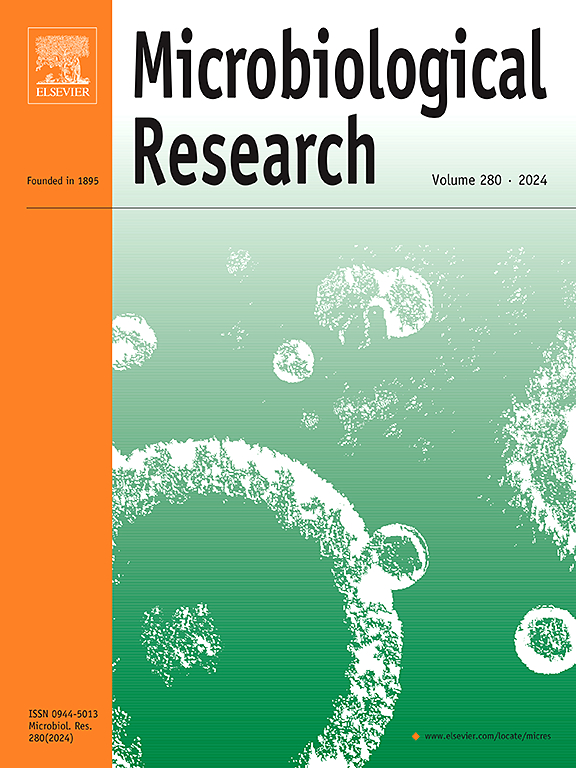Novel plant-derived compounds modulate gut microbiome dysbiosis in colitis mice: A potential therapeutic avenue for inflammatory bowel disease
IF 6.9
1区 生物学
Q1 MICROBIOLOGY
引用次数: 0
Abstract
Inflammatory bowel disease (IBD) is a chronic, multifactorial disorder of the gastrointestinal tract, often associated with dysbiosis in gut microbiota. While the exact cause of IBD remains unclear, alterations in gut microbiome composition and function are recognised as key contributors to IBD pathogenesis. Natural compounds with anti-inflammatory properties are increasingly explored as potential therapeutic options for IBD. This study evaluated the therapeutic effects of two newly isolated galloyl glucosides—galloyl-lawsoniaside A (comp-4) and uromyrtoside (comp-6)—alongside dexamethasone (DEX) on microbiome regulation in a 2, 4, 6-Trinitrobenzene sulfonic acid (TNBS)-induced colitis mouse model. We employed PacBio HiFi full-length 16S rRNA gene sequencing on mouse colon tissue to assess changes in the intestinal microbiome and its associated functional pathways. TNBS-induced colitis significantly altered microbial composition, increasing the abundance of Acutalibacter muris, Monoglobus pectinilyticus, Streptococcus pneumoniae, Parabacteroides merdae, and Haemophilus influenzae, while decreasing Staphylococcus ureilyticus and Mailhella massiliensis. Treatment with comps 4 and 6 effectively restored the imbalanced microbiota. Functional pathway analysis revealed that colitis reduced microbial pathways, including peptidoglycan biosynthesis and the Bifidobacterium shunt. These disruptions were restored following treatment with our plant-derived compounds. Functional improvements were likely associated with reduced IL-6 production and restoring intestinal barrier integrity. Notably, comp-4 exhibited the most pronounced therapeutic efficacy across both microbial and host-associated parameters. In silico docking further supported the anti-inflammatory and immunomodulatory potential of these compounds. Together, our findings highlight the interplay between microbial function and host immunity in IBD and identify plant-derived galloyl glucosides as promising candidates for microbiome-targeted IBD therapeutics.
新型植物源化合物调节结肠炎小鼠肠道微生物群失调:炎症性肠病的潜在治疗途径
炎症性肠病(IBD)是一种慢性、多因素的胃肠道疾病,通常与肠道微生物群的生态失调有关。虽然IBD的确切病因尚不清楚,但肠道微生物组组成和功能的改变被认为是IBD发病的关键因素。具有抗炎特性的天然化合物越来越多地被探索作为IBD的潜在治疗选择。本研究在2,4,6 -三硝基苯磺酸(TNBS)诱导的小鼠结肠炎模型中,评估了两种新分离的没食子酰葡萄糖苷——没食子酰lawsoniside A (comp-4)和尿myrtoside (comp-6)与地塞米松(DEX)一起对微生物组的调节作用。我们对小鼠结肠组织采用PacBio HiFi全长度16S rRNA基因测序来评估肠道微生物组及其相关功能通路的变化。tnbs诱导的结肠炎显著改变了微生物组成,增加了死亡针状杆菌、果胶单胞杆菌、肺炎链球菌、merdae副杆菌和流感嗜血杆菌的丰度,同时减少了尿毒葡萄球菌和马塞勒麦氏杆菌的丰度。对照4和对照6有效地恢复了不平衡的菌群。功能通路分析显示,结肠炎减少了微生物通路,包括肽聚糖生物合成和双歧杆菌分流。用我们的植物源性化合物处理后,这些破坏得以恢复。功能改善可能与减少IL-6产生和恢复肠屏障完整性有关。值得注意的是,comp-4在微生物和宿主相关参数中都表现出最显著的治疗效果。硅对接进一步支持了这些化合物的抗炎和免疫调节潜力。总之,我们的研究结果强调了IBD中微生物功能和宿主免疫之间的相互作用,并确定了植物来源的没食子酰糖苷是微生物组靶向IBD治疗的有希望的候选者。
本文章由计算机程序翻译,如有差异,请以英文原文为准。
求助全文
约1分钟内获得全文
求助全文
来源期刊

Microbiological research
生物-微生物学
CiteScore
10.90
自引率
6.00%
发文量
249
审稿时长
29 days
期刊介绍:
Microbiological Research is devoted to publishing reports on prokaryotic and eukaryotic microorganisms such as yeasts, fungi, bacteria, archaea, and protozoa. Research on interactions between pathogenic microorganisms and their environment or hosts are also covered.
 求助内容:
求助内容: 应助结果提醒方式:
应助结果提醒方式:


